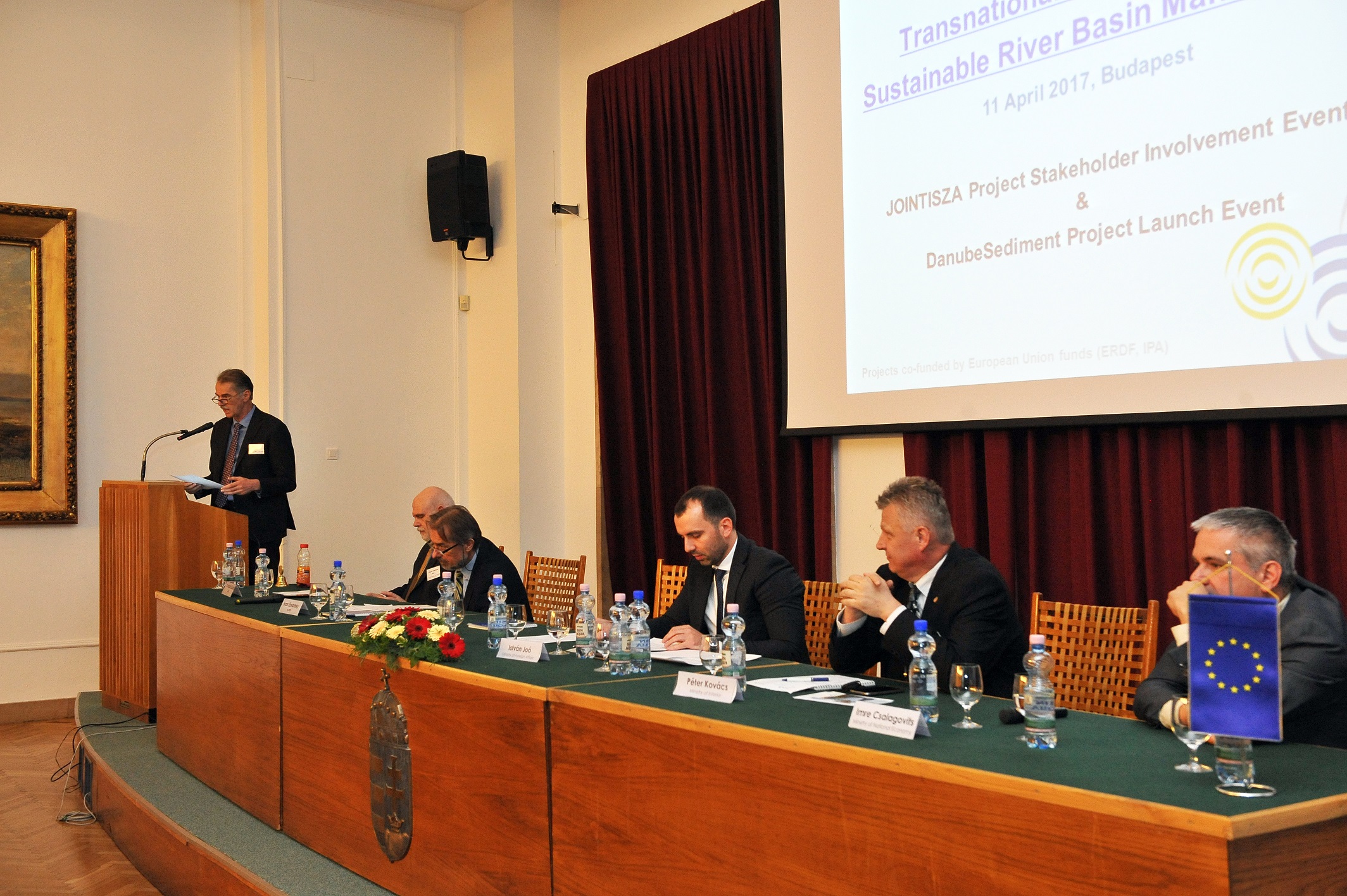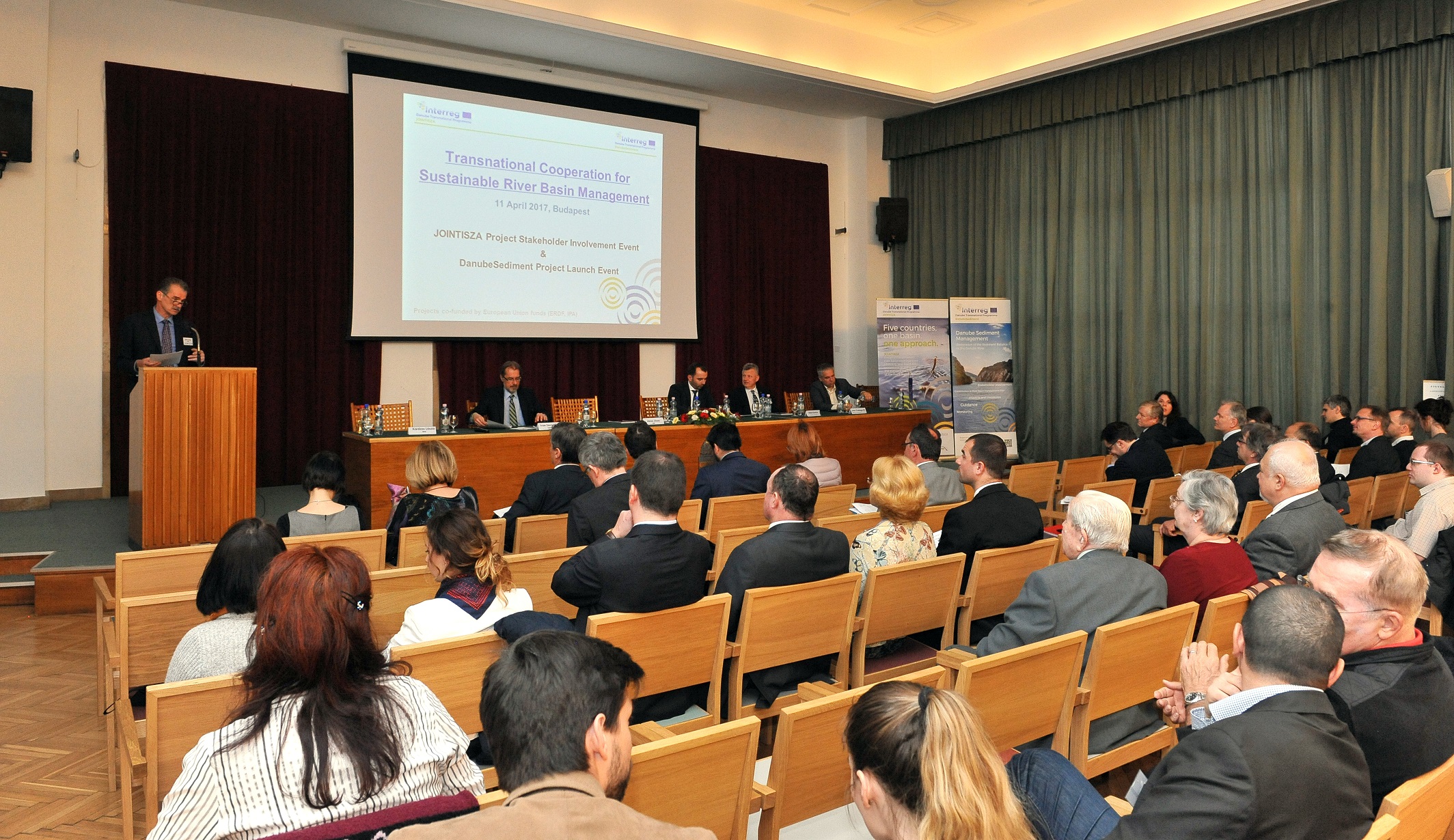DanubeSediment - PRESS RELEASE: Conference on Transnational Cooperation for Sustainable River Basin Management
20-04-2017
The “Transnational Cooperation for Sustainable River Basin Management Conference”, held last week at the Budapest University of Technology and Economics, introduced the combined efforts of projects supported by the Danube Transnational Programme that aim to improve liveability in the Danube River basin.
Over 80 participants from 8 Danube countries took part in the event, which showcased the goals, activities and outputs of these projects. The event’s morning session focused on JOINTISZA project stakeholder involvement. The presentation and discussion highlighted the importance of upgrading the Integrated Tisza River Basin Management Plan. Compared to its predecessor, the second version represents a huge step forward with the integration of additional sectors. The plan also includes more detailed provisions related to flood-, drought- and urban planning. Regarding efficient water management, the importance of preserving ecological status was underlined. The possibilities and effects of river navigation possibilities also have to be considered to the extent that time and budget will allow. Based on prior experiences, it was suggested that there is the need to build trust through information dissemination and consultation with other stakeholder sectors, and to get them more involved in sharing experience and data.
During the part of the event dedicated to the formal inauguration of the DanubeSediment and JOINTISZA projects, János Józsa, Rector of the Budapest University of Technology and Economics, mentioned that tailoring the DRBMP and Flood Risk Directive is much like “taking seriously what has been considered a merely ‘fashionable’ subject.” István Joó from the Hungarian Ministry of Foreign Affairs and Trade added that the role of Central and Eastern European countries is expanding in terms of transnational programme sub-basin activities, and that the greater involvement of non-EU countries provides evidence of clear vision on behalf of the Hungarian Presidency of the Danube Region Strategy. Ivan Zavadsky, Executive Secretary of ICPDR, noted that the ICPDR provides all Danube countries with a framework for transboundary cooperation, including at sub-basin level. Adding that the outcomes of these projects will provide valuable input to the Danube River Basin Management Plan, Zavadsky wished the project teams success, perseverance and innovative thinking in their future implementation efforts.
 The DanubeSediment Project Launch Event brought together project partners and key stakeholders from across the Danube Region for the first time. To introduce the project, steps towards building up knowledge about the sediment regime in the Danube were presented. A second block focused on building up governance and discussed guiding principles on sediment management. During two open discussions, the event offered stakeholders and decision makers an opportunity to learn about the main goals and outputs of the project. For example, the audience and project partners discussed which tributaries to include in the Danube sediment monitoring and how experience from pilot areas can be transferred to other areas. Associate strategic partners discussed their views on the expectancies for sediment management in the field of hydropower generation, nature protection and fairway maintenance. Project partners and key stakeholders emphasized that in order to produce adequate solutions for sustainable sediment mangement, stakeholders will be closely involved throughout the project.
The DanubeSediment Project Launch Event brought together project partners and key stakeholders from across the Danube Region for the first time. To introduce the project, steps towards building up knowledge about the sediment regime in the Danube were presented. A second block focused on building up governance and discussed guiding principles on sediment management. During two open discussions, the event offered stakeholders and decision makers an opportunity to learn about the main goals and outputs of the project. For example, the audience and project partners discussed which tributaries to include in the Danube sediment monitoring and how experience from pilot areas can be transferred to other areas. Associate strategic partners discussed their views on the expectancies for sediment management in the field of hydropower generation, nature protection and fairway maintenance. Project partners and key stakeholders emphasized that in order to produce adequate solutions for sustainable sediment mangement, stakeholders will be closely involved throughout the project.
Presentations:
Inauguration session presentations
Photo credit: Philip Janos
Click on our gallery for more pictures of the event.
Background on the projects
The DanubeSediment and JOINTISZA projects are both co-funded and implemented under the umbrella of Interreg Europe – a European Union programme for interregional cooperation that helps regional and local governments across Europe to develop and deliver better policy – through the targeted Danube Transnational Programme (DTP), which promotes economic, social and territorial cohesion in the Danube Region through policy integration in selected fields.
Fourteen partners from nine countries participate in the DanubeSediment project - Restoration of the Sediment Balance in the Danube River. Through transnational cooperation, DanubeSediment will close knowledge-gaps, develop a Danube sediment balance and a Danube Sediment Management Guidance. Together with a Sediment Manual for stakeholders, this document will comprise measures for sustainable sediment management to be implemented by stakeholders. The project will deliver key contributions to the 3rd Danube River Basin Management Plan and the 2nd Danube Flood Risk Management Plan to be developed by the International Commission on the Protection of the Danube River (ICPDR). Overall funding for the DanubeSediment project is 3.6 million EU.
JOINTISZA involves 17 partners across five countries sharing the Tisza River Basin (Hungary, Romania, Serbia, Slovakia, and Ukraine) in order to identify solutions to common challenges. JOINTISZA focuses on the interactions of two key aspects of water management — river basin management (RBM) and flood protection — while taking into account the relevant stakeholders who play a pivotal role in the Tisza RBM planning process. The main output of the project will be an updated final draft of the Integrated Tisza RBM Plan, which already includes the primary aspects of the Floods Directive. The amount of overall funding for JOINTISZA, which runs until Jun 2019, is EUR 2.2 million.
For more information:
Danube Transnational Programme (DTP)
Press contacts:
DanubeSediment Project Communication Team
+49 821 9071-5539
JOINTISZA Project Communication Team
+36 1 225 44 00 / +36 26 504 000
jointisza@ovf.hu / ikoszta@rec.org
